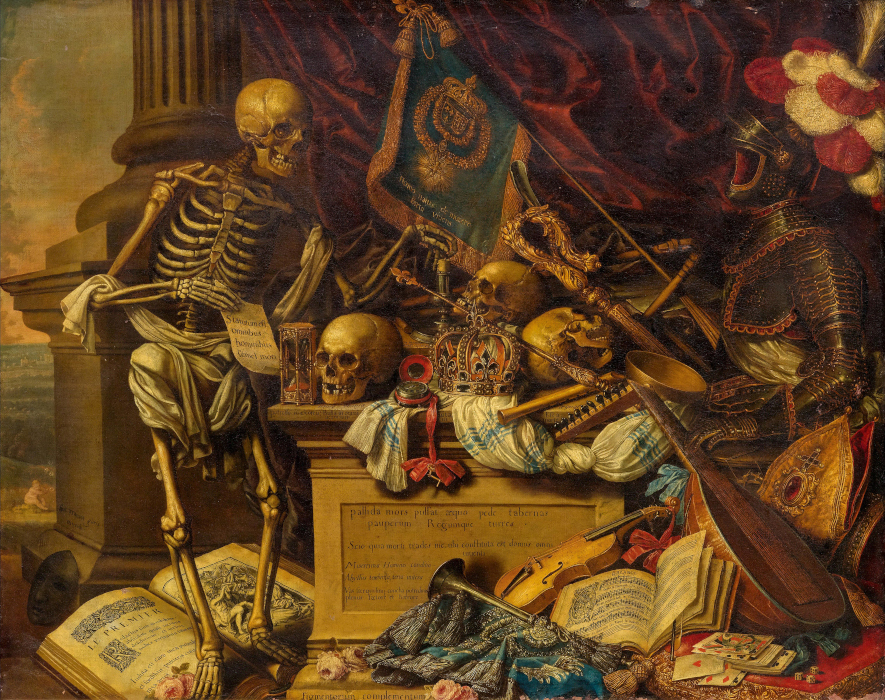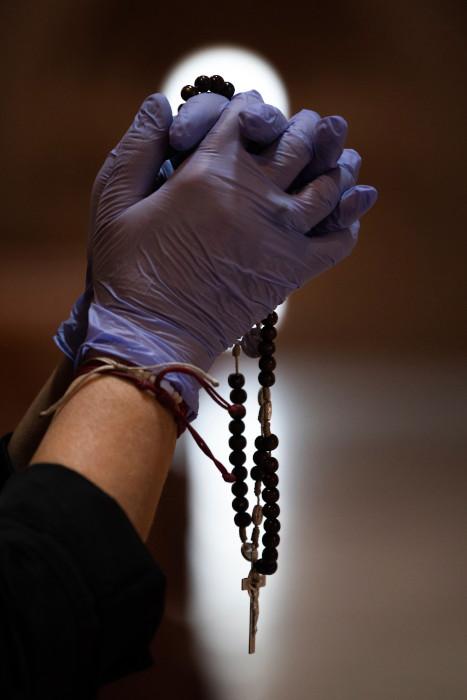
A Memento Mori still life painting by Carstian Luyckx, circa 1650. Image courtesy of Creative Commons
I'm in quarantine, due to contact with someone who has come down with COVID-19, but I am showing no symptoms.
Nonetheless, my isolation has given me time to think about how we are all going to die one day; we just don't know when. It is easy to ignore death when we are young or in good health, but sickness and other disasters force us to recognize our finitude. A pandemic makes it impossible not to think about death.
Death is the great leveler; it affects the rich and poor, the famous and the humble, the powerful and the weak, saints and sinners.
In the parable of the rich fool in the Gospel of Luke, Jesus tells the story of a rich man who plans to build larger barns for his harvest, but God said to him, "You fool, this night your life will be demanded of you; and the things you have prepared, to whom will they belong?" And Jesus concludes, "Thus will it be for the one who stores up treasure for himself but is not rich in what matters to God."
In the Gospel of Matthew, Jesus also describes how we will be judged after death. "I was hungry and you gave me food," says the Son of Man. And those who were righteous go to eternal life.
The Latin "Memento mori" — "Remember death" — was said to victorious Roman generals, lest they become arrogant and ambitious. The phrase was picked up by spiritual writers to remind Christians that someday they will face judgment.
St. Ignatius Loyola, the founder of the Jesuits and a great spiritual guide, recommended meditating on death as part of his "Spiritual Exercises," a series of meditations to help a person on retreat come closer to God and discover what he wants us to do. Ignatius asks the retreatant, if you were on your deathbed looking back on your life, what decisions do you wish you had made? This helps the retreatant review past decisions but, more importantly, think about future decisions.
Here are some things we might think about doing during this pandemic when we meditate on death.
First, we need to think about family. Pope Francis says that the most important words in a family are "Thank you" and "I am sorry."
Granted that the elderly are most susceptible to the coronavirus, call home and say, "Thank you." Thank your parents for all the sacrifices they made for you. Be specific. This may be your last chance. True, they were not perfect parents, but they did the best they could. If you are a parent now, you understand that.

A Catholic worshipper using protective gloves prays with a rosary beads at the Santa Maria de Cana parish in Pozuelo de Alarcon, outskirts Madrid, Spain, Sunday, March 15, 2020. Pope Francis has praised people for their continuing efforts to help vulnerable communities, including the poor and the homeless, amid the coronavirus pandemic. The vast majority of people recover from the COVID-19. According to the World Health Organization, most people recover in about two to six weeks, depending on the severity of the illness. (AP/Bernat Armangue)
Tell them that you are sorry for being self-centered and immature and for not telling them often enough that you love them. If they are already dead, don't worry, they can still hear you.
Parents, call your children. The clock is ticking; your time is running out. Tell them how proud you are of them. How happy you are that you had them. Tell them that you love them and are sorry you were not a better parent. Tell them that they are the best thing that ever happened to you. Tell them that when you are gone, they will be fine and you will cheer for them from heaven.
Then call your friends and those who have been important in your life. Tell them how much they mean to you. Thank them for sticking with you when you were a jerk or just boring.
And if you are really brave, call a couple of enemies and tell them you are sorry for whatever you did to pour coals on the fires of your dispute. Tell them you want to heal this wound, to be reconciled. If it doesn't work, if they hang up on you, let it go.
If you know anyone who is sick, send them prayers and best wishes. If you call them, keep it short; this is about them not you.
And finally, if we make it through all this, don't forget we will still die someday. So let's use the time left for us to make this world a better place by being kind to people and planet Earth before we die.
Being a week in quarantine, I guess I should practice what I preach.
My parents are gone and I have no children, but I am grateful to my Jesuit family for their tolerance, companionship and humor. I am grateful to all the journalists with whom I have interacted over the years. (I would just rather my daughter not marry one.)
And I am grateful to you readers. I am always amazed that anyone reads my columns or cares what I have to say. Likewise, parishioners who have been so patient listening to me preach. My apologies for my clericalism and not being a better source of spiritual nourishment.
But for a Christian, death is never the end. We believe in the resurrection, in life after death. So I especially thank God for life and the beautiful world he gave us and for his son who loved us and led the way.
So the next time you see a beautiful sunset, raise your glass and praise the Lord. And may we all party in heaven.
[Jesuit Fr. Thomas Reese is a columnist for Religion News Service and author of Inside the Vatican: The Politics and Organization of the Catholic Church.]
Editor's note: You can sign up to receive an email every time a new Signs of the Times column is posted. Sign up here.
Advertisement








